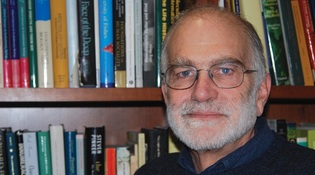 loading
loading
Light & VerityProf speaks out on Chinese plagiarism Mark Zurolo '01MFAWhile teaching in China, Stephen Stearns '67 encountered rampant plagiarism. View full imageWhen Stephen C. Stearns ’67 sent an e-mail message about plagiarism to his students at Peking University last December, he thought he was writing for an audience of 38. He had no inkling he would tap into a deep vein of concern running through the Chinese academy. But within days, his e-mail went viral on the Internet -- and became a test case of Yale's policy of constructive engagement with the world's newest superpower. Stearns, an ecology and evolutionary biology professor at Yale, was in China teaching two seminars as part of an exchange program with Peking (known familiarly as Beida). While grading a paper, he encountered a passage written in English prose far more sophisticated than that spoken by the student. He plugged the first paragraph into a Google Scholar search and discovered that it had been lifted word for word from a published paper. He took a closer look at other papers and found that several more also passed off published work as original. Outraged, Stearns told his students that such plagiarism was unacceptable. He gave them three days to resubmit their papers with proper attribution. Most students complied. Two more, however, handed in clearly plagiarized papers. "By that point, I was getting pretty irritated," Stearns recalls. On December 19 he e-mailed a cri de coeur to the 38 students in his two seminars. "Plagiarism disturbs me greatly, both because it corrodes my relationship with you as my students, and because it tells me things about China and Beida that neither you nor I want to hear," Stearns wrote. "When a student whom I am teaching steals words and ideas from an author without acknowledgment, I feel cheated, dragged down into the mud." Stearns proceeded to decry a "larger pattern of behavior in China" encompassing not just widespread plagiarism, but also pirating of DVDs and production of defective and dangerous products -- all unpunished, even encouraged, by authorities. Stearns immediately heard back from two students. They asked for permission to post his piece on the university's official biology website. He said yes. He returned to the United States two days later to an outpouring of e-mails from academics throughout China and around the world who shared and amplified his concerns (although a few questioned his right as an outsider to judge Chinese society). The episode was the subject of articles in the Chinese press and, in this country, the Chronicle of Higher Education. More than 800 websites posted translated versions of his letter and hosted extended debates, in which commenters wrote of rampant plagiarism and of professors who encouraged students to plagiarize. More encouraging was an e-mail from Yi Rao, dean of Peking University's College of Life Sciences. He thanked Stearns, acknowledged the problem, and vowed to fire professors found to engage in academic dishonesty. He urged Stearns not to give up hope. "We will regain our long-held tradition of honesty and trust." Stearns indeed maintains hope. The episode has revealed to him a great movement by a younger generation of academics like Yi Rao to reinstitute standards in the academy, he says. China can change, he concluded. If he could write the letter over, he would have softened some of his sweeping condemnation of Chinese society. In this way, Stearns's experience was indeed an educational exchange. He influenced China's educational system, and he learned lessons in turn. All of which supports one rationale for Yale's extensive ties with China: that constructive engagement can produce positive change. Is he pleased by the outcome? "Not pleased, but certain that I was correct in doing the right thing. On balance it was constructive."
The comment period has expired.
|
|